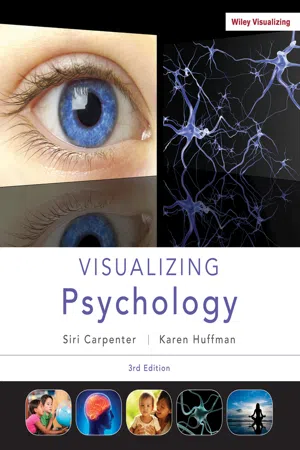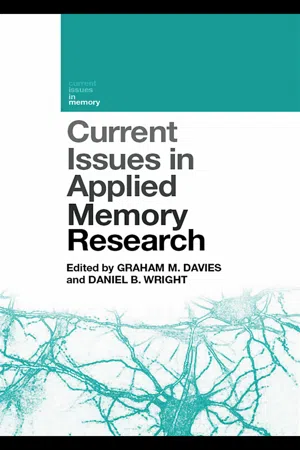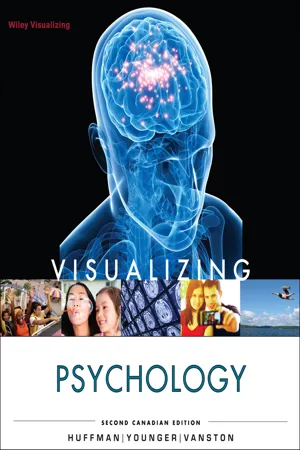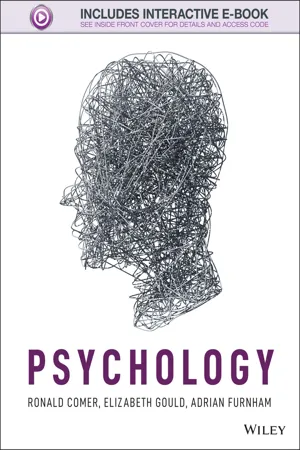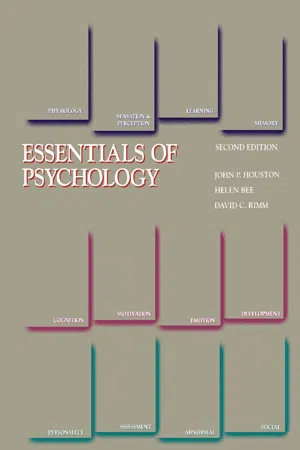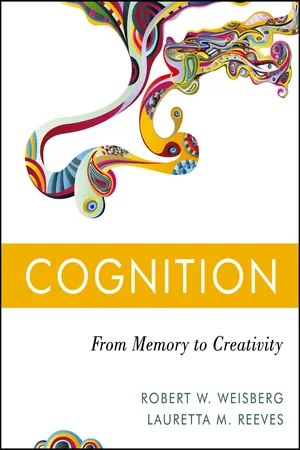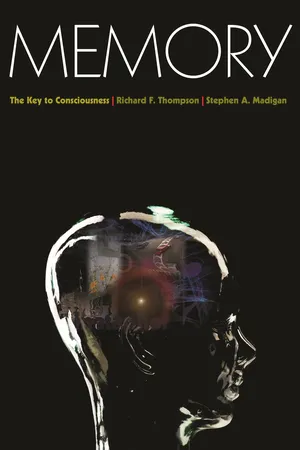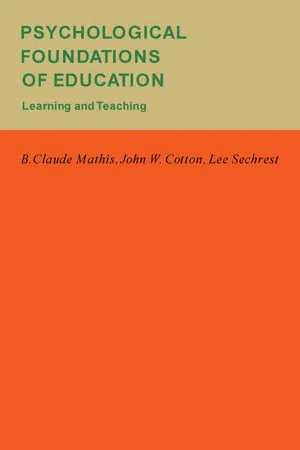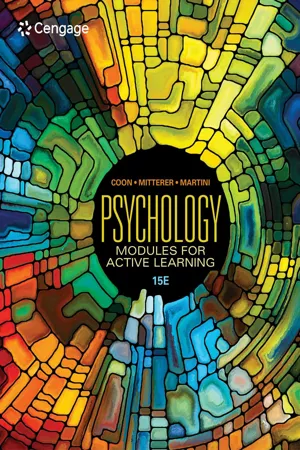Psychology
Forgetting in Psychology
Forgetting in psychology refers to the loss of information from memory. It can occur due to various factors such as interference, decay, or retrieval failure. Forgetting is a natural and adaptive process that allows the brain to prioritize important information and discard irrelevant or outdated memories.
Written by Perlego with AI-assistance
Related key terms
1 of 5
11 Key excerpts on "Forgetting in Psychology"
- eBook - PDF
- Siri Carpenter, Karen Huffman(Authors)
- 2012(Publication Date)
- Wiley(Publisher)
Then compare your responses with those in Appendix B. sychologists have long been interested in how and why we forget. Hermann Ebbing-haus first introduced the experimental study of learning and forgetting in 1885 ( Psychologi-cal Science on the next page). Psychologists have developed several theories to explain forgetting and have identified a number of factors that can interfere with the process of forming memories. We discuss some of these theories and factors in this section. Theories of Forgetting If you couldn’t forget, your mind would be filled with meaningless data, such as what you ate for breakfast every morning of your life. Similarly, think of the incredible pain you would continuously endure if you couldn’t distance yourself from tragedy through forgetting. The ability to forget is essential to the proper functioning of memory. But what about those times when forgetting is an inconve-nience or even dangerous? P 186 CHAPTER 7 Memory There are five major theories that explain why for-getting occurs ( Study Organizer 7.2 ): decay, interference, motivated forgetting, encoding failure , and retrieval failure . Each theory focuses on a different stage of the memory process or a particular type of problem in processing information. In decay theory , memory is processed and stored in a physical form—for example, in a network of neurons. Connections between neurons probably deteriorate over time, leading to forgetting. This theory explains why skills and memory degrade if they go unused (“use it or lose it”). In interference theory , forgeting is caused by two com-peting memories, particularly memories with similar qualities. There are two types of interference: retroactive interference and proactive interference ( Figure 7.6 ). Motivated forgetting theory is based on the idea that we forget some information for a reason. According to Freud-ian theory, people forget unpleasant or anxiety-producing information either consciously or unconsciously. - eBook - PDF
- Catherine A. Sanderson, Karen R. Huffman(Authors)
- 2019(Publication Date)
- Wiley(Publisher)
Forgetting 217 Theories of Forgetting Psychologists have developed several theories to explain why forgetting occurs ( Figure 7.11): decay, interference, motivated forgetting, encoding failure, and retrieval failure. Each theory focuses on a different stage of the memory process or a particular type of problem in processing information. • Decay theory focuses on the way memory is processed and stored in a physical form—for example, in a network of neurons. Connections between neurons may deteriorate over time, leading to forgetting. This theory explains why skills and memory degrade if they go unused (“use it or lose it”). • According to interference theory, forgetting results from two competing memories, and par- ticularly memories with similar qualities. At least two types of interference exist: retroactive TIP Are you having trou- ble remembering these five theories? If so, think of how forgetting involves memories that grow “dimmer,” and note that the acronym created from the first letter of each theory has almost the same spelling—D-I-M-E-R. INFORMATION INFORMATION INFORMATION INFORMATION Long-term memory (LTM) Sensory memory Short-term memory (STM) Decay theory (memory deteriorates over time) Interference theory (forgetting due to proactive or retroactive interference) Motivated forgetting theory (painful memories forgotten) Encoding failure theory (material from STM to LTM never encoded) Retrieval failure theory (information is momentarily inaccessible) FIGURE 7.11 Theories of forgetting Which of these five theories of forgetting best applies to this cartoon? Mick Stevens/CartoonStock 218 CHAPTER 7 Memory Old information Names of fish New information Interferes with R e t r o a c ti v e i n t e r f e r e n c e Names of college students Old information New information Interferes with New boyfriend or girlfriend’s name P r o a c ti v e i n t e r f e r e n c e Bob Sue Bill Ann Old boyfriend or girlfriend’s name a. - eBook - ePub
- Graham M. Davies, Daniel B. Wright(Authors)
- 2009(Publication Date)
- Psychology Press(Publisher)
2 Retrieval-induced forgetting
The unintended consequences of unintended forgetting
Malcolm D. MacLeod, Jo Saunders and Laura ChalmersWhen we are asked to think about memory and how it works we often tend to conceptualize it in terms of what we can remember, how much we can remember, and for how long we can remember it. Even for memory theorists, memory tends to be characterized in terms of its storage capacity, retention capabilities, and the processes underlying these properties (i.e., encoding, storage, and retrieval). Forgetting, in contrast, hardly gets a mention. To some extent, the reason for this is that forgetting is a largely ‘invisible’ phenomenon. Unless we know what we have forgotten, it is difficult to know that we have forgotten it! When we do become aware of weaknesses in our memorial armature, forgetting is typically seen as a nuisance or hindrance – something that should, wherever possible, be avoided. At its most benign, forgetting can be regarded as a ‘blip’ or error in an otherwise smooth-running system; something that happens from time to time when insufficient attention is being paid to what we are doing. At its most insidious, forgetting may irreconcilably alter our awareness of what is current and what is real, and even undermine our concept of self (e.g., in the advanced stages of dementia).Implicit in these conceptions of memory is the notion that forgetting is maladaptive or, at the very least, something that happens when memory is not working properly. Yet, there are indications that some forms of forgetting may be just as important as remembering in order for our memories to work effectively. Théodule Ribot (1887), over a century ago, recognized the potential importance of forgetting when he noted that ‘Forgetfulness, except in certain cases, is not a disease of memory, but a condition of health and life’ (p. 61). Similarly, William James (1890) drew our attention to the possibility that our memories would be much poorer if it were not for the fact that we forget. In other words, rather than considering forgetting as the inevitable product of a system that is operating less than optimally, we need to consider the possibility of forgetting as an integral part of memory – something that is intrinsically linked to our ability to remember. Arguably, without the capacity to forget, we would find it impossible to remember, at least in any purposive goal-directed manner (Macrae & MacLeod, 1999). - eBook - PDF
- Karen R. Huffman, Alastair Younger, Claire Vanston(Authors)
- 2013(Publication Date)
- Wiley(Publisher)
Theories of Forgetting If you couldn’t forget, your mind would be filled with meaningless data, such as every snack you’ve ever had in your life, or every outfit you have ever worn. Similarly, think of the incredible pain you would continually endure if memories of life’s tragedies did not fade with time? The ability to forget is essential to the proper functioning of memory. Our annoyance with forgetting occurs when we forget things we did not intend to forget. These are the 1. Describe Ebbinghaus’ research on learning and forgetting. 2. Outline the five key theories of why we forget. 3. Explain the factors that contribute to forgetting. P times when forgetting is an inconvenience, and we might fail to recognize how adaptive and useful it really is. Five major theories attempt to explain why forgetting occurs (Figure 7.11): decay, interference, encoding failure, retrieval failure, and motivated forgetting. Each theory fo- cuses on a different stage of the memory process or a par- ticular type of problem in processing neural information. Errors in Remembering Since Ebbinghaus’ original research (see Psychological Science: How Quickly We Forget), scientists have discovered numerous factors that contribute to inaccurate remem- bering. Five of the most important are the misinforma- tion effect, the serial position effect, source amnesia, the sleeper effect, and spacing of practice. loved ones, cannot take care of himself or herself, and needs nursing care around the clock. The person ultimate- ly dies from the advancing disease. Alzheimer’s does not attack all types of memory equally. A hallmark of the disease is an extreme decline in explicit/declarative memory (Haley, 2005; Libon et al., 2007). People with AD fail to recall facts, information, and personal life experiences, yet they still retain some implicit/nondeclarative memories, such as simple clas- sically conditioned responses and procedural tasks, like brushing their teeth and hair. - eBook - PDF
- Ronald Comer, Elizabeth Gould, Adrian Furnham(Authors)
- 2014(Publication Date)
- Wiley(Publisher)
We recall events differently from the way in which they occurred or we remember things that never occurred at all. Theories of Forgetting As we have observed, some apparent losses of memory are not really instances of forgetting at all, but rather failures of attention. If our mind is elsewhere when we are putting down our set of keys or the remote control, we simply can- not encode such acts. Correspondingly, the location of such items will not be stored in memory and available for later retrieval. At the other end of the spectrum, some material is indeed stored and available, but has weak or few retrieval cues attached to it, making it difficult for people to activate – or cue – the relevant memories from storage. Beyond these common causes of forgetting, theorists have uncovered a number of variables that may actively interfere with memory and, in turn, produce forgetting (Macleod et al., 2010; Wixted, 2010, 2004). Each of today’s leading expla- nations of forgetting has received some research support, but, as you will see, each also has key limitations and raises important questions. Decay As we observed earlier, German researcher Herman Ebbinghaus pioneered the study of forgetting over a century ago by systematically testing his own memory of lists of non- sense syllables (e.g., lin, pav, sul). After rehearsing and mas- tering a particular list, Ebbinghaus would measure how well he had retained the syllables after various intervals of time: 20 minutes, two days, a month later, and so on. He found that there was a huge drop in his memory of a list soon after learning it. However, the amount that he forgot eventually levelled off; in fact, most of the information that had been retained 10 hours after first memorizing a list remained in his memory three weeks later. Known as the forgetting curve (Figure 10.8), this pattern of rapid memory loss followed by a stable retention of the remaining information has been supported repeatedly by research (Erdelyi, 2010). - eBook - PDF
- John P. Houston, Helen Bee, David C. Rimm(Authors)
- 2013(Publication Date)
- Academic Press(Publisher)
Memory Learning and memory: intertwined processes The definition of retention Learning and retention together Measures of retention Recall Recognition Relearning Recognition versus recall The three components of memory Encoding Storage Retrieval Interference theory Retroactive inhibition Proactive inhibition Decay theory CHAPTER FIVE Information processing I: separatees tore models Sensory memory Short-term memory Long-term memory Organization in long-term memory: lexical memory How many memories? Information processing II: levels of processing Issues in memory State-dependent memory: context effects Consolidation and retrograde amnesia Summary Key terms 160 Chapter 5 Memory What do we know about memory and forgetting? Intuitively, we are all aware that learning is a relatively difficult task, while forgetting is painfully easy. As you study for the examinations in this course, you will probably spend many hours attempting to commit all the required information to memory. Unfortunately, you may find that your efforts will be somewhat frustrated. You are likely to forget much of the information quickly, par-ticularly after the examination. Learning requires work, while forgetting seems effortless. The fact is that normal forgetting is more drastic than many people suppose, as you can see by the following experiment. Suppose you memo-rize a list of nonsense syllables such as WUZ, JAT, CIS, BIL, LEM, RAK, TUR, NOP, FEX, ZEP, and GOW. You practice until you can recite them on demand. Then you cease practice, and we test your ability to recall the items over several minutes, hours, and days. What do you think will happen? Figure 1 shows the kind of result we can expect. As you will notice, the amount you remember will drop dramatically at first and then begin to level off after two or three days. This rapid drop represents a lot of forgetting for the critter that is supposed to be tops in the animal king-dom. - eBook - ePub
Cognition
From Memory to Creativity
- Robert W. Weisberg, Lauretta M. Reeves(Authors)
- 2013(Publication Date)
- Wiley(Publisher)
A final possible function for forgetting is that it allows us to adapt most efficiently to our changing environments. That is, if the world has changed significantly since you learned some information, so the old learning is no longer relevant, then it may be most efficient to forget it. In that case, retroactive interference would allow new information to be easier to retrieve than older and now-outdated memories. A good example is computer technology: People with extensive experience with computers who only remembered how to use the original operating systems that they learned would not be in a strong position in today's world. On the other hand, if some aspect of the world has only changed a little, then old information will still be relevant (such as switching from an early version of a smart phone to an updated model). Under those circumstances, it should be more efficient to retain old and well-learned information. There is no question that this way of functioning is on the whole adaptive. What we recall in a situation will, all other things being equal, reflect our experiences in that situation. Thus, forgetting may result in our behavior matching the long-term regularities we have encountered in the environment (Anderson & Schooler, 1991).Research on Forgetting: Conclusions
We have now reviewed studies that examined forgetting for many different types of materials, including CVCs, words, pictures, and autobiographical memories of various sorts. This research has used many different types of methods, including recognition and recall tests and physiological responses, to measure retention and forgetting over intervals ranging from several minutes to several decades. Forgetting seems to be related to the type of material being learned, as well as to the amount and distribution of the original learning experiences with the material. Information without meaning, which can only be processed in a bottom-up manner, is forgotten faster, which is why forgetting for CVCs has been found to be very rapid compared with that for pictures or words (e.g., Shepard, 1967 ;Standing, 1973). In addition, both overlearning and distributed practice (i.e., spreading learning experiences out over periods of time) decrease the rate of forgetting. The wider the distribution of learning episodes in time, the less forgetting that is found (Bahrick et al., 1993).Accuracy of Memory for Dramatic Events: The Question of Flashbulb Memories
One of the reasons that researchers are interested in forgetting is because it would seem that all of our memories are subject to it. However, it has been proposed that there may be one kind of memory—memory for an unexpected, dramatic, and highly emotional event—that is not subject to forgetting. The study of those memories, called flashbulb memories - eBook - PDF
Memory
The Key to Consciousness
- Richard F. Thompson, Stephen A. Madigan(Authors)
- 2013(Publication Date)
- Princeton University Press(Publisher)
When they ORDINARY FORGETTING 95 were given graduation photos as retrieval cues, they were able to recall about 50 percent of the names. And when they were given a recognition test, they averaged about 80 percent correct—50 years after graduation! The Causes of Forgetting However effective various methods of prompting and cuing are, the basic fact remains that forgetting occurs. Once upon a time you could have recalled most of your classmates’ names, and you certainly would have been able to recognize all of them. What happened as time went by? Why can you no longer do this, and why do you now need memory prompts? The ideas that memory decays as time goes by or that memory weakens with disuse have long been common answers to these questions, but there are problems with them as explanations. As the psychologist John McGeoch famously put it many years ago, “In time, iron may rust and men grow old, but the rusting and the aging are understood in terms of the chemical and other events which occur in time, not in terms of time itself.” McGeoch ac- knowledged that there were good reasons for thinking that over long periods of time, the biological basis of memory might dete- riorate. His main argument against decay as a general explanation of forgetting was a simple and powerful one: Over a given period of time, the amount of forgetting that occurs can be increased or decreased by varying the nature of the events that occur during that time interval , particularly in ways that interfere with memory for a given event. The process is known as retroactive interference and is a basic and very general cause of forgetting. Interference and Forgetting Allan Baddeley demonstrated an interesting example of retroac- tive interference in everyday life events (see Table 4-3). He was able to arrange and control where people parked when making two successive visits to a clinic. The experiment went like this: - eBook - PDF
Psychological Foundations of Education
Learning and Teaching
- B. Claude Mathis, John W. Cotton, Lee Sechrest(Authors)
- 2013(Publication Date)
- Academic Press(Publisher)
Forgetting curves such as Fig. 5-8 may be presumed to result from an increased number of words spoken or observed by the learner as time passes between learning and testing. A popularized presentation of material on the topic of short-term 172 Chapter Five 1.0 .ol 1 1 1 1 1 1 1 3 6 9 12 15 18 Recall interval (seconds) Fig. 5-8. Frequency of correct recalls as a function of recall interval. (Only those recalls which took no longer than average for the experiment, 2.83 seconds, are included.) [Figure 3 from Peterson and Peterson (52). Copyright 1959 by American Psychological Association, and reproduced by permission.] memory was recently published in Scientific American (51), and is recommended as supplementary reading. Two-Process Theory Although laymen tend to think of forgetting as an inactive process in which the neural record or trace of something previously learned simply decays or fades away, the interference theory of forgetting has been dominant in psychology until very recently. However, the short-term memory data recently obtained have led a number of psychologists to feel that just after exposure to a stimulus a memory trace is indeed formed and that this trace decays rapidly as time passes or new stimuli occur. The present section takes this new point of view, in the sophisti-cated form we call two-process theory. There are two kinds of memory processes, short term and long term. If a stimulus is perceived, it is placed in short-term memory and can be recalled as long as it stays in short-term memory. If it receives attention or is rehearsed by the learner, it may be shifted into long-term memory Forgetting and Extinction 173 and therefore more or less permanently retained. (Probably interference theory is most applicable to the forgetting of material in long-term memory though some theorists de-emphasize interference factors even there.) Without rehearsal or attention, an item's trace in short-term memory decays and is lost completely. - eBook - PDF
Essentials of Psychology
Concepts and Applications
- Jeffrey Nevid(Author)
- 2021(Publication Date)
- Cengage Learning EMEA(Publisher)
These events may be too emotionally troubling—provoking too much anxiety or guilt—to be consciously experienced. A soldier may have at best a dim memory of the horror he experienced on the battlefield and remember nothing of his buddy being killed; yet his memory of other past events remains intact. Rarely is dissociative amnesia of the type that fuels many a daytime soap opera, the type in which people forget their entire lives—who they are, where they live, and so on. Concept Chart 6.2 provides an overview of the key concepts of forgetting. BRIDGING PERSPECTIVES Concept Chart 6.2 Forgetting: Key Concepts Concept Description Example Decay theory Gradual fading of memory traces as a function of time Facts you learned in school gradually fade out of memory over time. Interference theory Disruption of memory caused by interference of previously learned material or newly learned material After sitting through your biology lecture, you forget what you learned in chemistry class the hour before. Retrieval theory Failure to access material stored in memory because of encoding failure or lack of retrieval cues You have difficulty remembering something you know is stored in memory. Motivated forgetting Repression of anxiety-provoking material You cannot remember a traumatic childhood experience. Recall task Test of the ability to reproduce information held in memory You recite a phone number or the capitals of U.S. states or the provinces of Canada. Recognition task Test of the ability to recognize material held in memory You recognize the correct answer in a multiple-choice question. Retrograde amnesia Loss of memory of past events After suffering a blow to the head in a car accident, you are unable to remember details of the accident itself. Anterograde amnesia Loss or impairment of the ability to form or store new memories Because of a brain disorder, you find it difficult to retain new information. - eBook - PDF
Psychology
Modules for Active Learning
- Dennis Coon, John Mitterer, Tanya Martini, , Dennis Coon, John Mitterer, Tanya Martini, (Authors)
- 2021(Publication Date)
- Cengage Learning EMEA(Publisher)
This difference is based on the fact that new learning can interfere with the ability to retrieve previous learning. Interference refers to the tendency for new memories to impair retrieval of older memories (and the reverse). It seems to apply to both short-term and long-term memory (Radvansky, 2017; Rodríguez-Villagra et al., 2013). (Sleep can improve memory in another way: REM sleep and dreaming appear to also help us con-solidate memories. See Module 24.) It is not completely clear whether new memories alter existing long-term memory traces or whether they make it harder to retrieve earlier memories. In any case, there is no doubt that interference is a major cause of forgetting (Radvansky, 2017). In one classic study, college students who memorized 20 lists of words (one list each day) were able to recall only 15 percent of the last list. Students who learned only one list remembered 80 percent (Underwood, 1957) ( ➤ Figure 34.7 ). The college students who studied nonsense syllables and then slept remembered more because the type of interference called retroactive interference was held to a minimum. Retroactive interference (RET-ro-AK-tiv) refers 80 70 60 50 40 Percent remembered Sad mood during learning Happy mood during learning Mood while recalling words Sad Sad Happy Happy ➤ Figure 34.5 The effect of mood on memory. Participants best remembered a list of words when their mood during testing was the same as their mood when they learned the list. (Adapted from Bower, 1981.) Percent remembered Hours after learning 100 20 40 60 80 Awake Asleep 0 1 2 3 4 5 6 7 8 9 10 ➤ Figure 34.6 The amount of forgetting after a period of sleep or wakefulness. Notice that sleep causes less memory loss than activity that occurs while one is awake. (After Jenkins & Dallenbach, 1924.) Disuse (in memory) Proposition that memory traces weaken when memories are not periodically used or retrieved.
Index pages curate the most relevant extracts from our library of academic textbooks. They’ve been created using an in-house natural language model (NLM), each adding context and meaning to key research topics.
